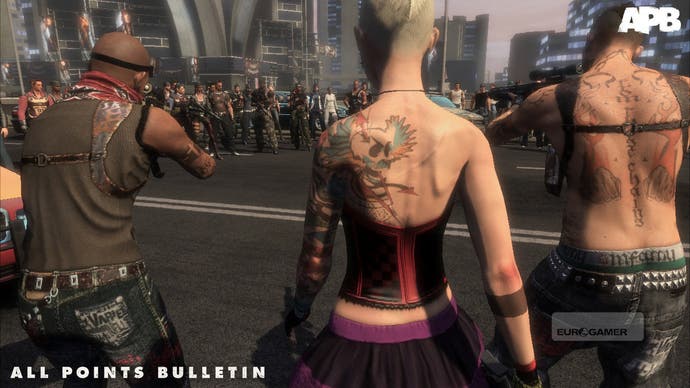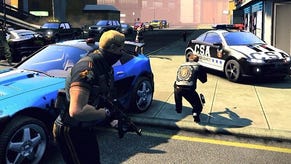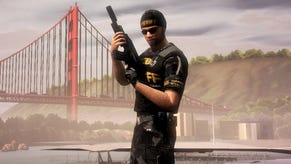Realtime Worlds' David Jones
The APB mastermind, direct from GDC.
David Jones, boss of Dundee's Realtime Worlds, is hanging out on Epic's thronged, buzzing, walled-in stand on the Game Developers Conference show floor. He's been helping Mark Rein hawk the Unreal engine by running live demos of the Unreal-powered APB, direct from the online crime game's beta servers.
The compact Scot, still boyish in appearance but with an unassuming, confident manner that's very grown-up, worked on the likes of Lemmings for Psygnosis before co-founding DMA Design, later Rockstar North, and co-creating Grand Theft Auto. He founded Realtime Worlds in 2002, and the studio made its name with Crackdown, an exuberant open-world actioner for Microsoft.
It's now approaching the finish line on APB, an almost-massively multiplayer crime game that pitches 100 players, controlling criminals and Enforcers, into the seedy city of San Paro. Featuring a mission system that dynamically matches players against each other, deep customisation of your characters' look, vehicles and even theme tune, and more twitchy, thunderous driving and shooting than any MMO can boast, APB is an easy sell but still raises many questions. Not least, how Realtime is going to pay to run it, since it's not going to charge a subscription despite sky-high server costs.
We found a semi-quiet corner of the Epic stand and sat down for a lengthy chat with Jones, keen to get APB in sharper focus.

Yes, we are in a position to set our release dates. That's completely up to us. Obviously as soon as we're happy that we've had enough feedback from many thousands of players, that we're in a good enough position, then that's when we'll make the release date known.
Yep. I would say that's still pretty achievable, yep.
Not a hundred per cent - not until effectively we've got completely zero-bug builds, that it's had all the testing and all the iteration that it needs. But I'd say we're really not far away from that now.
Very different. It's amazing how small and subtle the differences are. But they're huge actually when you practically try to sit down and make one of these games. It is night and day.
One example I use is, you've got a bunch of programmers on a game, they write a bit of the game, they play it and try it out and implement it, and effectively they work by themselves. Every programmer on this is working on I call a hundred-player game because that's what it's optimised around per city. And so they write a feature for a game and think, "I need a hundred people to test this feature now." When you've got every single programmer saying the same thing... that's quite a challenge.
It's a whole different ball game, I have to say. It's key for us to be well funded, have the time, not be forced to release the game when it wasn't quite ready.

I would say it's basically what we've just talked about. There's an awful lot of unknowns doing the first version, and in some respects, as we went on, we thought, you know what? We should really just focus on making one of them absolutely right.
Console is very different to PC in terms of online gaming. There's a lot of things outwith our control - Microsoft and Sony are platform holders, and have their take on running servers, billing... A lot of things we're doing are untried and untested. If we have done a great game, and it's a hit, and it's actually more like the kinds of games console owners want to play than other online games, then that's probably a better position to come from than, you know, "Hey, we've got this great idea."
Absolutely. So it has to be something that everybody wants to do, where everybody's clear on what we can do and what we can't do. So there are a lot of issues like that where we said, let's just make one, make it great, get all the issues out of the way. It'll also need a fair bit of redesign as well I think.
And we do. Every player has a rating, and I've seen players with a rating of 200-plus. And that surprises me because that is one of those stats that shows how much of the game they've consumed. How many contacts they've successfully worked for, how many items they've unlocked in the game.
We have daily, weekly, monthly leagues for many, many things in the game. And you have the traditional things like kill-to-death ratios, the most cars stolen, for Enforcers how many people they've arrested. Arresting is an interesting mechanic for Enforcers because they can just kill people within a mission, but they can also arrest them. It's quite a bit harder to do, but for some very organised clans, as you can imagine, that's a very prestigious league to win. And the rewards scale based upon those leagues. It's very competitive.







